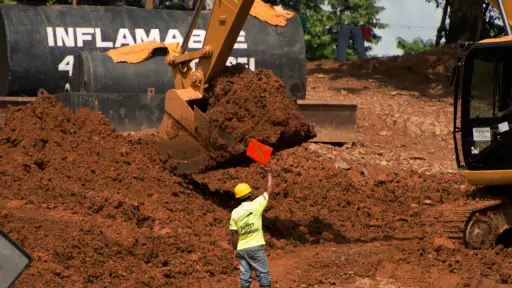Indigenous Calendar March, 2018: The Sequence of Progress

Any product or service is worth exactly what someone is willing to pay for it. So states the most basic principle of economics. Reality is different: supply-side and demand-side principles teach us that the price someone is willing to pay can be manipulated. Likewise, we all have our intuition about what represents progress. Here, too, reality can differ from what seems intuitive. So when, a few days ago, The Fat Boar restaurant in Wrexham, Wales, United Kingdom began "Mobile Free Mondays," with a 25% discount for diners who agree not to use their mobile phones during their meal, it represented one of the biggest progressions in the hospitality industry in decades, but an even bigger progression in our own social evolution.
There are very few roads in the Ngäbe-Bugle comarca in Panama, Central America; almost none of them is paved. But that is changing. In this month's photo we see a construction project that had just begun when I took the photo a little over a year ago. Just north, over the hill, is the boundary of that comarca. This project will build a paved road through it that will eventually reach Calovébora on Panama's north coast.
Most of us would intuitively call this progress. True progress for the first indigenous peoples of the "New World" meant any developments that increased their survival odds. Key among those developments was the domestication of plant-based food sources. It may surprise us to learn that much of our diet comes from domesticated plants whose still-wild counterparts would kill us if we ate them.
In northwestern South America one such plant is quinoa. It was domesticated there at least five thousand years ago. Embraced by the Inca, it was shunned immediately by the Spanish. Consumption soon became socially stigmatized — despite quinoa's high nutritional value — and production quantity fell. Quinoa was more than just a food source for those pre-Columbian peoples, though. It had both religious and social significance. Perhaps partly for those reasons, it was almost entirely a subsistence crop — until very recently.
A "perfect storm" had been brewing for thirty years and its forces collided around ten years ago. Young adults born of indigenous farmers in northwestern South America had been migrating en masse to urban centers. Many consumers, in the United States and Europe in particular, were beginning to question their diet of chemically-treated, genetically-modified, industrial-scale food production with its over-reliance on meat as the primary source of protein.
Into this "perfect storm" entered marketers. With advertising slogans like "ancient harvest," "earthly choice," "a grain from antiquity" and "soul food from the Andes" they propelled the "worth" of quinoa to skyrocketing new heights. Most of us would intuitively think of this development as progress for the indigenous people of the area but, once again, the reality is different.
Quinoa was now almost entirely a cash crop. The indigenous farmers who grew it had largely stopped eating it and were using part of their newly disposable income to buy junk food. The young, indigenous urban migrants could no longer afford to eat it.
For five thousand years the history of quinoa has been an exemplary case study in progress as it relates to indigenous peoples. Recently a new chapter in that history began when scientists announced that they had sequenced the quinoa genome. While this development carries the long-term potential to bring a highly nutritious, affordable food source to more parts of the world, it will also lower the income of indigenous Andean farmers.
A few days ago the Panamanian government published a well-fashioned public relations article as the road neared the half-way mark. It extolled the many obvious benefits that the road will bring. It did not remark on the real potential for the road to open up the comarca to land grabs from outsiders. Progress, for indigenous people, is a complex interplay of social, political and economic considerations.
Travel Story: Skirting Panama's Ngäbe-Bugle Comarca.
If you enjoyed reading this article, please consider supporting independent, advertising-free journalism by buying us a coffee to help us cover the cost of hosting our web site. Please click on the link or scan the QR code. Thanks!


